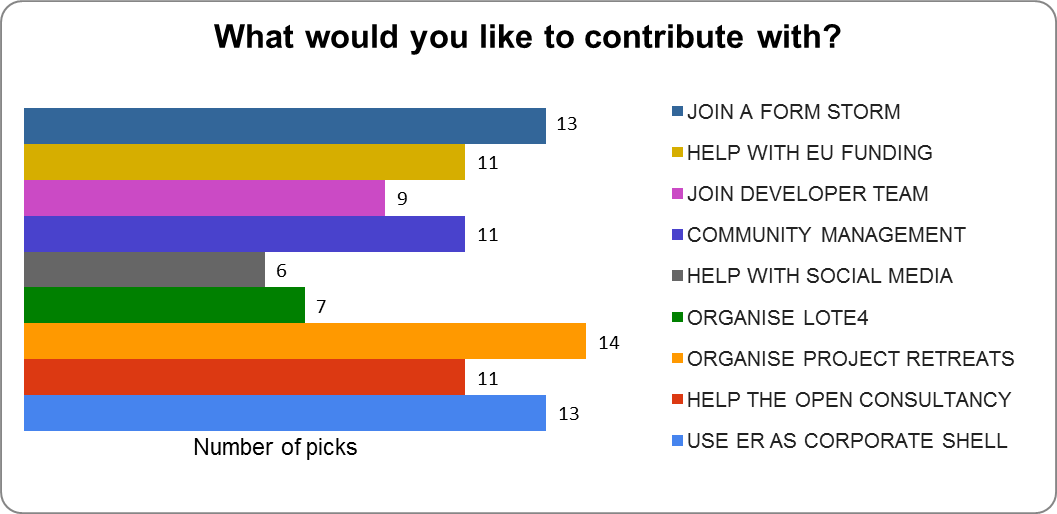Present: Dorotea, Ruxandra, Pamela, Jara, Nadia, Noemi, Matthias, Michael, Alex
Presentation + needs + replies
Matthias: in Nepal, initially on a UNDP project mapping alternative local leaders, now connecting disaster relief efforts together with the newly extended Nepal Edgeryders team.
- Needs: how to get the locals’ stories online and connect them to an international dialogue to gather input from the wider Edgeryders community (especially challenging since Nepal has a largely oral culture).
- Replies: [Alex] perhaps a sms-based citizen reporting tool, as OnOurRadar.org has. [Nadia] if it would require editors to develop the story then it’s not sustainable. Need to find a mechanism that would make it work autonomously on the long run, even without facilitators.
Noemi: Romania-based Edgeryders community builder & manager for 4 years, currently working on Spot the Future Bucharest - a project looking to identify and connect citizen initiatives as a first step towards collaborations - contracted for engaging difft projects in process of the Bucharest candidacy for European Cultural Capital.
- Needs: how to go about identifying initiatives in Bucharest and what format should a workshop have to draw (and keep) people in. Maybe informal beer gatherings, first? Or one big event?
- Replies: [Nadia] please, no “networking events”. Events should have an aim. Building something. [Alex] Mapping and connecting with smaller groups/tribes at first might be more fruitful, since in Bucharest tribes aren’t all that coagulated yet and calling everyone to one big event might dilute meaning and commitment to the community. Clear & tribe-specific call to actions might help draw people in. [Nadia, recapping] 1. Map groups/tribes of people interested in specific things 2. Sketch out possible things they might be interested in achieving/having access to (shared interests and relevant goals) 3. Articulate very clear call to action targeted to a specific tribe.
[Noemi] In ER there is already high diversity, how to reconcile that with building very specific calls for local micro tribes? The social contract -> connect, then bring resources & build paid opportunities may not hold for everyone (this was Edgeryders 1, our first big project and how we came about). [Nadia] You don’t design to speak to everyone. [Noemi] But in an early stage, an exploratory pilot in a city you know nothing about, how do you go about it? And if you do plan a local event where people come meet other people they’re interested in and connect 1-on-1 and then leave, how do you signal value beyond immediate connections? [Nadia] You get them to stay by creating value for them. For instance, matchmaking between people in the city - finding ways to strategically pool resources and efforts across people and projects.
Ruxandra: Bucharest-based Babele co-founder - online platform providing social start-ups with mentorship - and OuiShare member planning a joint workshop in Bucharest (with Edgeryders, other networks + London guy promoting co-working spaces around the world) in June.
Nadia: Brussels-based Edgeryders founding member with many different roles, from community engagement to business development.
- Needs: how to get events to be conducive to action (they’re costly and excluding of people not in town, so publishing resulting documentation online and providing tools for everyone to use that content is critical) + how to coordinate a sustained social media drumbeat so everyone knows what everyone else is doing, how they can get involved, and help to spread the news. A kind of decentralized social media team.
- Replies: [Matthew] Participation in Edgeryders is project-driven, so that makes consistent commitment to the platform tricky. It would take something different from the current methodology to create something like an Edgeryders culture. [Nadia] This reminder about what Edgeryders is about would help: https://edgeryders.eu/en/blog/sharing-visions-of-edgeryders-the-first-community-survey-responses The question still is how do we build a strong consistent core of community manager and builders. How do we develop a habit of a weekly social media drumbeat between engagement managers? Something like a daily email offering 3 things to tweet daily, and a distributed social media team that can update calendars constantly.
Pamela: “London-based co-founder and main volunteer of Dadamac Foundation and also co-counder of other related things to do with integrated development and living in a rapidly changing world. My areas of expertise are related to traditional and newly emerging approaches to education/learning/knowledge-development and to integrated community development (local and global). On a macro level I’m interested in deep systemic change related to the impact of the Internet on how we “Connect, Communicate and Collaborate”. Everything I do is a mix of practical work, reflection, theory, and back to more practical work.”
- Needs: find areas of overlap with Edgeryders + better use of networks in order to actively grow them.
Alex: new on platform, Bucharest-based, HeyMarie.com founder - community of young adults discussing the big topics & concerns of adult life, from professional choices to relationships, sexuality, identity, alternative lifestyles - currently focused on starting a conversation about the nature of work in times of uncertainty and alternative livelihood options for gen Y-ers in Romania and elsewhere.
- Needs: understanding the inner workings of Edgeryders.
- Replies: [Nadia] Our current infrastructure is 1. Weekly Hangout calls like this one (and the documentation from them e.g. https://edgeryders.eu/en/agora/weekly-community-call-thursday-at-1100-cest-on-skype) 2. The weekly Community News Calendar https://edgeryders.eu/en/agora/community-newsletter-14-05-2015-were-building-case-study 3. The Weekly Community Newsletter that also goes out to the entire mailing list: https://edgeryders.eu/en/agora/community-newsletter-14-05-2015-were-building-case-study
Michael: nomading around Berlin, working in community activism. Interested in Edgeryders as an experiment in community collaboration.
